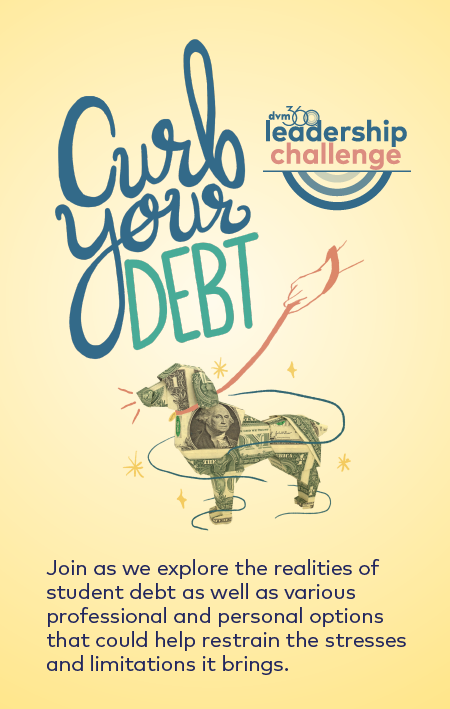5 steps to get you out from under vet school debt
A little common senseand some support from your veterinary colleagueswill keep you from being crushed by the mountain.

Hate to say it, ladies, but those designer boots need to wait until you're financially stable. (Shutterstock.com)Think there's no way you can scale the steep cliff of your student debt? You absolutely can-but you need to be realistic about your situation. Here are some tips that have helped me and I'm passing along to you.
1. Frame your expectations. While you were scrimping and saving your way through your veterinary education, you may have fantasized about your first real job-and the paycheck that would let you buy the things you want. But I have some sad news: Your first few years out of vet school is not the time to pull out all the stops.
I went to a local VMA meeting last winter and someone joked that three of the veterinarians present were wearing the same designer boots. I was one of those veterinarians. I had agonized over the purchase of the boots, and I'm a practice owner (who just finished paying off my student debt last year). The other two attendees were associate veterinarians and recent graduates.
I know how it is to scrape and save, and eat ramen noodles all through vet school. There was a time when I had 17 cents in my checking account and there were times when I was overdrawn. I get it. When you graduate, you have visions of how things will be when you have a paying job-but the industry has let you down.
Just because you've graduated doesn't mean you're out of the woods on debt (or learning). I'm sorry to tell you, but designer clothes and expensive tastes may have to wait until you're more financially stable. It may not be good news, but it's life.
2. Don't borrow anymore money. We don't think of credit cards as borrowing, but they are. It's way too easy to feel like you're not even spending money when you use a credit card. When I first graduated from veterinary school, I got a credit card. I felt like an adult and I used the credit card to furnish my new grown-up apartment. It was awesome!
But when the bills started to come in and my new-graduate salary allowed payment only of the minimum monthly fee, I soon felt the sting of ridiculous interest rates and carried-balance fees. It's a fact of business that no one is going to let you use their money without paying a fee. The credit card companies are no different.
This is how a credit system functions: You get to buy all the cool things right now, but it's not cool when you forget how much you've charged and then the bill comes. Don't forget that credit card companies are really banks, and charging items is increasing debt.
3. Create a budget for yourself. There are computer programs and apps available at no charge through many banks to help you manage your income and expenses. You might find that you have very little left over after you pay your expenses, and this is disheartening, but it's important to be aware of where your money is going. If you're oblivious to your budget and just depend on how much is in your bank account at any given time, you'll end up going further into debt just to make ends meet.
No matter how excited you are to be out in the working world, you cannot let yourself be carried away on unrealistic visions. You have to build your life on the facts. If you don't live below your means, you'll never see your way out of debt.
4. Analyze your options. After you look at your income-to-expense ratio and set up your budget, look critically at your current employment situation. Is there an opportunity for growth with the practice? Write down the pros and cons of your current situation. If the pros don't outweigh the cons, you need to gather information on other options.
In certain parts of the country, the veterinary market is more competitive, which drives down salaries. If you relocate to an underserved area, that position may pay you better-and come with a lower cost of living.
The AVMA provides economic information and job listings to members free of charge. Be aware that in certain parts of the country, the veterinary market is more competitive, which drives down salaries. If you relocate to an underserved area, that position may pay you better-and come with a lower cost of living. These positions tend to be in rural settings, and even if you don't see your future in a rural practice, you'll gain valuable hands-on experience with a varied caseload and clientele.
When your debt is paid, you can do a self-evaluation of where you want to settle permanently. You might find that you enjoy something that's quite different from where you originally saw yourself. (I went to veterinary school with a passion for equine medicine and I now own a small animal practice. Life is funny like that.)
5. Manage extra money wisely-but give yourself a break, too. If you're watching your budget, you'll know if you have a little extra money. There are online surveys veterinarians can take that pay honorariums to help cover your expenses or provide a little fun money. You might get a tax refund.
If you do get some unexpected (and unbudgeted) money, apply at least 80 percent of your windfall to your debt, but spend 20 percent on yourself for something that will improve your quality of life. Treat yourself to ice cream. Buy a book. Take yourself on an adventure. Find affordable things to do in your area with a Google search-type in, “Fun and free things to do in ______.” All work and no play makes Dr. Jack a dull girl!
The biggest thing you can do, no matter your situation, is know you're not alone. We are a veterinary community and your colleagues know how you feel. If you need someone to talk to, there are groups you can join on social media. You can comment on this article or reach out to me by email (kat@drprimm.com). Veterinary debt is a very real hurdle, and if we work together to support each other and discuss our challenges, everyone wins.
Kathryn Primm, DVM, the author of Tennessee Tails: Pets and Their People, owns Applebrook Animal Hospital in Ooltewah, Tennessee. She is a frequent contributor to dvm360.com and other publications, and she was the nation's first Fear Free certified professional.
